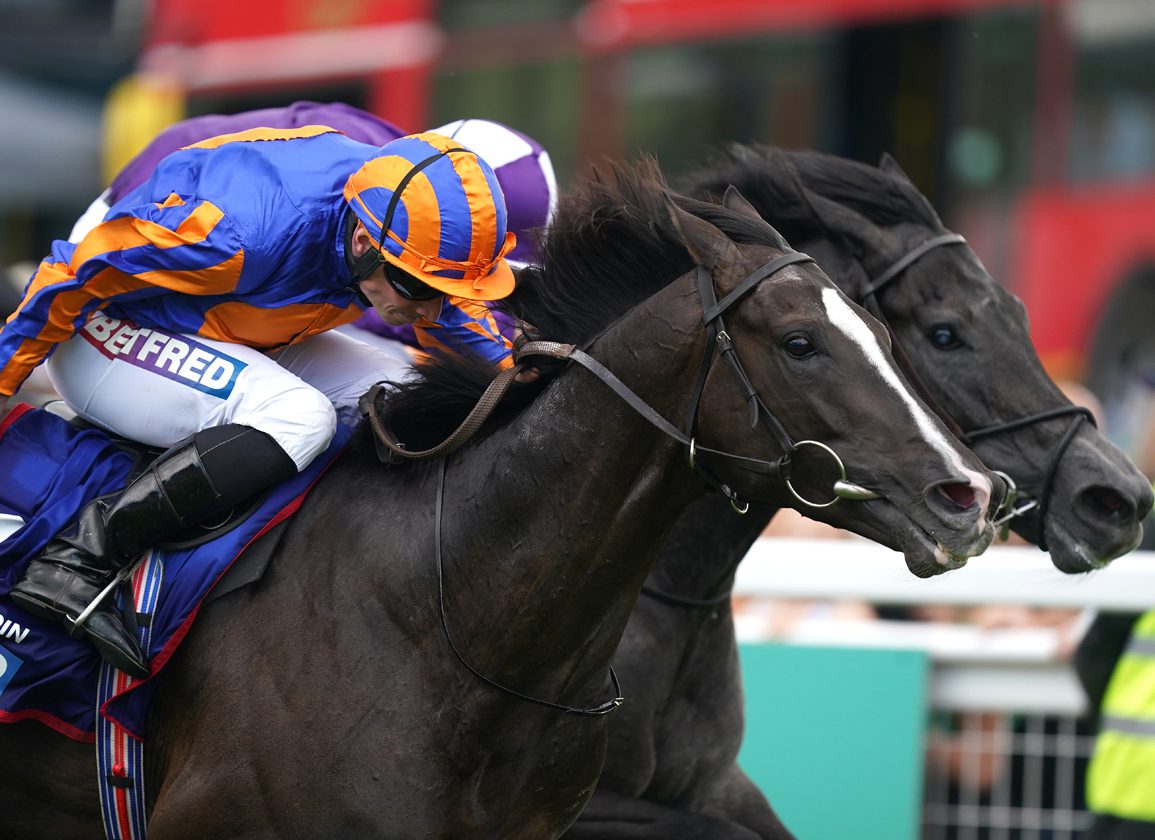By Emma Berry
So begins the campaign for Auguste Rodin (Ire) to meet Desert Crown (GB) and Adayar (Ire) in the King George VI and Queen Elizabeth S. This column has precisely zero influence over anything at all, but as a racing fan increasingly concerned at the sidestepping of the greatest prize of high summer then it would be remiss of me not to bang the drum and rattle the tambourine a little.
How often have the last three winners of the Derby all still been in training? (We can make that four, actually, but Serpentine has long since ventured down under and is now a gelding.) To have three remaining in Europe offers an opportunity unprecedented in the modern era for this trio to engage in a battle of the generations. That could happen in the Coral-Eclipse, of course, which may also include Sunday's hugely impressive Prix du Jockey Club winner Ace Impact (Ire), and for which last year's winner Vadeni (Fr), Emily Upjohn (GB), Luxembourg (Ire) and Nashwa (GB) are all among the entries. But, with no intended offence to Sandown, it really should be all about Ascot, and I mean in July rather than June.
For a start, the King George, as Britain's second-most valuable race after the Derby, is worth £500,000 more than the Eclipse at £1,250,000. At this level, it is not only about prize-money of course. For the colts, the level of support in a future stallion career is at stake. Despite the Derby remaining a coveted prize, it is mystifying that so often the rest of the winner's career revolves around trying to pretend that he hasn't won it and would really be better suited by ten furlongs. Of course, the perfect stallion prospect is one who has excelled at a mile, ten furlongs, and a mile and a half. Step forward, Sea The Stars (Ire), who remains the beau ideal.
The more we see of the progeny of Frankel, the more convincing it becomes that he too could have been a top-level 12-furlong performer. It is a moot point, however, and the exuberance of his early years could well have been his undoing had he been asked to go for the Derby. But what he gave us a racehorse is, almost unbelievably, being matched by his stallion career as Frankel adds stakes winner after stakes winner to his record.
Lady Bamford's Soul Sister (GB) became his second Oaks winner after Anapurna (GB), both of whom were ridden to victory for the Gosden stable by the inimitable Frankie Dettori. John Gosden first won the King George with Frankel's great rival, Nathaniel (Ire), and later with two more of his Oaks winners, Taghrooda (GB) and Nathaniel's daughter Enable (GB). The latter of course won it three times in four years and her dominance may well have been part of the reason that there were only three runners when she claimed her third victory in 2020. That year's Derby winner Anthony Van Dyck (Ire) had been supposed to run but was a late scratching.
This century, only Galileo (Ire) and Adayar have won the King George in the year they also won the Derby, while Alamshar (Ire) triumphed after winning the Irish Derby, and the aforementioned Taghrooda and Enable both won in their Classic seasons. You don't need to scroll back too far to see the names of the brilliant three-year-old King George winners Nijinsky, Mill Reef, The Minstrel, Troy, Shergar (Ire), Reference Point (GB), Nashwan, Generous (Ire) and Lammtarra to know that it was once almost de rigueur for the Derby winner to make a mid-season appearance at Ascot in late July.
Look Back to Look Forward
There have been many changes within the sport of horseracing over the last century; some good, some bad. One comforting aspect for anyone interested in the breeding side is the sense of continuity conveyed by a horse's pedigree, even if a family has gone quiet for several generations.
Had we access to a time machine, we could go back 99 years to the 1,000 Guineas and watch Mumtaz Mahal (GB) and Straitlace (GB) being beaten into second and third by Plack (GB). The winner later featured as the third dam of the 1966 King George winner Aunt Edith (GB). Mumtaz Mahal, known as 'The Flying Filly', returned to sprinting after the Guineas and her contribution to the breed, through her position in the Aga Khan's broodmare band and beyond, has been immense. Last year, she featured as the tenth dam of the Arc winner Alpinista (GB).
Straitlace, meanwhile, went from Newmarket to win the Oaks, and her Epsom triumph was most recently copied by her twelfth-generation descendant Auguste Rodin (Ire). The female line of the Derby winner's family has been to America and back since those days, with Sheikh Mohammed having been the owner for a time of his fourth dam Rahaam (Secreto). Bred by Calumet Farm and Stephen Peskoff, Rahaam went on to produce the lightning-fast Cassandra Go (Ire) (Indian Ridge {Ire}), who then lends the heft of her Group 1-winning daughter and grand-daughter, Halfway To Heaven (Ire) (Pivotal {GB}) and Rhododendron (Ire) (Galileo {Ire}), as Auguste Rodin's first and second dams.
No Stopping on the Branch Line
It has for a while now been apparent that Frankel is becoming to his sire what Galileo was in turn to Sadler's Wells, who was himself responsible for establishing a hugely significant branch of the Northern Dancer sire-line.
It wasn't just Soul Sister's Oaks triumph that made for a good weekend for the Banstead Manor Stud resident. Kelina (Ire) took the G2 Prix de Sandringham for her owner-breeders Wertheimer & Frere, further enhancing a family that already boasts the Group 1 winners With You (GB), Call The Wind (GB) and We Are (Ire) as half-siblings to her dam Incahoots (GB) (Oasis Dream {GB}).
It is too early to talk of Frankel as a sire of sires but it is encouraging to see his son Cracksman (GB) represented by such an impressive individual as the Prix du Jockey Club winner Ace Impact (Ire). Fizzy in the parade ring with a handler each side, he put that nervous energy to good use on the track when coming from a long way back to make the highly-regarded Big Rock (Fr) (Rock Of Gibraltar {Ire}) appear almost to be standing still when he passed him in the straight to win by clear daylight.
Bred by German breeder Waltraut Spanner, who raced his dam Absolutly Me (Fr), Ace Impact is inbred to one of Germany's most influential mares of all time in Allegretta (GB), who is the grand-dam of Anabaa Blue (GB) (Anabaa), a Prix du Jockey Club winner himself and the broodmare sire of Ace Impact.
Farther back this family has roots in Lord Derby's Stanley House Stud, breeder of his fourth dam Rosia Bay (GB), who is a half-sister to Selection (GB), dam of the brilliant Ouija Board (GB). Rosia Bay's daughter Roseate Tern (GB), by the Derby winner Blakeney (GB), won the Yorkshire Oaks as well as being placed in the Oaks and the St Leger.
And while we reflect on the passing of the baton down this particular sire-line, it is worth noting the similar situation in Japan, where Sunday Silence was succeeded by Deep Impact (Jpn), among whose many sons at stud there appears to be a particular rising star in Kizuna (Jpn). A Derby winner like his sire, Kizuna was the leading first-crop sire of 2019 and for the last three years has not been out of the first five in the general sires' table. He was third last year and currently occupies that same position following the second consecutive GI Yasuda Kinen win at the weekend for his daughter Songline (Jpn). The five-year-old mare is now a three-time Grade 1 winner in Japan and appears to have the Breeders' Cup on her agenda for later in the year.
The New Normal?
The hitherto unseen levels of security at Epsom were described by the Jockey Club's chief executive Nevin Truesdale as “sadly necessary” when he spoke on Racing TV's Luck on Sunday show in the aftermath of the Derby.
He's not wrong. Even with an interest only as a spectator and scribbler on Saturday, my unease had grown through the week to the point of not really enjoying what is usually my favourite day of the year. That sense of dread must have been multiplied many times over for those actually connected to a runner or charged with ensuring that the meeting proceeded safely and smoothly.
Encouragingly, Surrey Police took the threat seriously enough to be proactive. Intelligence pertaining to the protestors led to the arrests of 19 people on the morning of the Derby, while another 12 arrests were made within the racecourse grounds.
While this and the Jockey Club's forward-thinking approach in applying for a High Court injunction are all to be applauded, it is hard to see that this level of planning and expense around major meetings is sustainable, especially at a time when British racing's finances are already squeezed.
“This probably is our new normal,” Truesdale admitted, and added in reference to the widespread disruption already seen outside racing caused by various protest groups, “I actually think we've done other sports and other activities a favour.”
The Derby itself wasn't done a favour, either by the early start time, or the train strikes on the day, both of which surely contributed to the number of attendees being just over half the previous year's figure at around 20,000.
As it transpired the number of protestors on the day was actually less than a tenth of the 1,000 promised by the group's spokesperson earlier in the week. But it only takes one, as it did, to get onto the course to cause a potentially catastrophic situation.
Positioned near the winning post to watch the Derby, I was heartened by the cheer of relief as the race went off as scheduled, but was almost instantly distracted by one of the many security guards positioned along the stands' rail as he flinched and started to run up the track. The booing started, a crew of six guards and police rugby-tackled the invader on the track and got him out of harm's way before the horses had even approached the top of the hill. For the second year in a row we watched protestors being dragged off the track at Epsom.
There is no doubt that the support behind this group is not significant, and they have shown themselves not only to be woefully ill-informed about racing and the needs of horses, but also not above lying in an attempt to remain in the headlines.
“I actually think we should stop talking about them now,” said Truesdale, and in this he is also right but, clearly, we cannot stop worrying about them, and that concern comes at a cost, both financial and reputational.
The new normal? Let's hope not.
Not a subscriber? Click here to sign up for the daily PDF or alerts.






